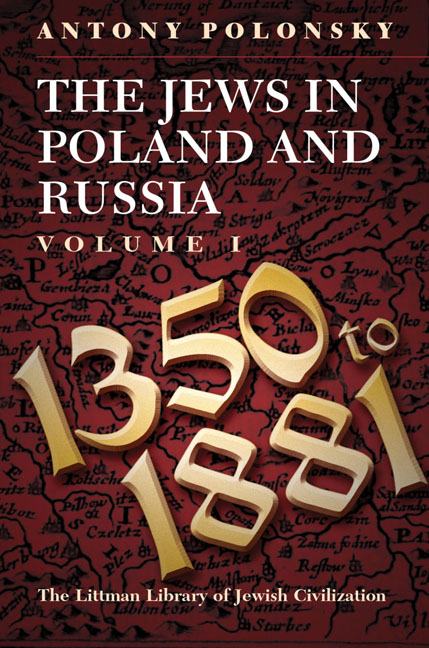Book contents
- Frontmatter
- Dedication
- Acknowledgements
- Contents
- List of Maps
- List of Tables
- Note on Transliteration
- Note on Place Names
- Maps
- General Introduction
- PART I JEWISH LIFE IN POLAND–LITHUANIA TO 1750
- PART II ATTEMPTS TO TRANSFORM AND INTEGRATE THE JEWS, AND THE JEWISH RESPONSE, 1750–1880
- Glossary
- Bibliography
- Index
4 - Jews in Economic Life
- Frontmatter
- Dedication
- Acknowledgements
- Contents
- List of Maps
- List of Tables
- Note on Transliteration
- Note on Place Names
- Maps
- General Introduction
- PART I JEWISH LIFE IN POLAND–LITHUANIA TO 1750
- PART II ATTEMPTS TO TRANSFORM AND INTEGRATE THE JEWS, AND THE JEWISH RESPONSE, 1750–1880
- Glossary
- Bibliography
- Index
Summary
When we use the words ‘Frenchman’, ‘Englishman’, ‘Spaniard’, we include all of the inhabitants of France, England, and Spain, because each individual is a constituent part of those states. It is not the same in Poland, as I observed. The three classes that make up the inhabitants do not constitute a nation. The nation is made up exclusively of the nobility, called the szlachta. The second class, that is, the Jews, are foreign to the state and merely serve the material interests of the first class. The third class [the peasants] are simply the property of the first.
HUBERT VAUTRIN, L’Observateur en Pologne, c.1770–80THE EVOLUTION OF THE POLISH–LITHUANIAN ECONOMY
UNTIL the late thirteenth century Poland and Lithuania were on the periphery of Europe and their larger economic significance was marginal. From the late fourteenth to the early seventeenth centuries there was a period of economic expansion, linked with the flourishing of the Polish grain trade. A period of economic decline with some interruptions began in the early seventeenth century and continued into the early eighteenth century, when a gradual recovery began.
In the years before 1300 Europe was only gradually recovering from the economic collapse caused by the barbarian invasions, the fall of the western Roman empire, and the conquest of the southern Mediterranean by the Arabs. At this time there were three main trading routes in northern Europe, one down the Dnieper from Scandinavia to the Mediterranean, one overland from the Atlantic through Germany and the Czech lands to the lands further east, and one connecting these two routes and going on to Moorish Spain. Although its volume was quite small, a variety of goods were involved in this trade: slaves from the Slavonic and Baltic lands, fur from Russia, salt from Pomerania, foodstuffs from Pomerania, Mecklenburg, and Holstein, and Frisian and Flemish cloth. Poland participated only minimally in this trade. Until the Tatar conquest the Khazar kingdom and the Grand Duchy of Kiev were much more important.
From the late thirteenth century a new period in Polish and Lithuanian economic history began. The catastrophic outcome of the Fourth Crusade, with its conquest and sack of Constantinople in 1204, signalled the decline of the Byzantine empire, and was followed by the Mongol invasion, which led to the disappearance of Kievan Rus.
- Type
- Chapter
- Information
- The Jews in Poland and RussiaVolume I: 1350 to 1881, pp. 91 - 113Publisher: Liverpool University PressPrint publication year: 2009

